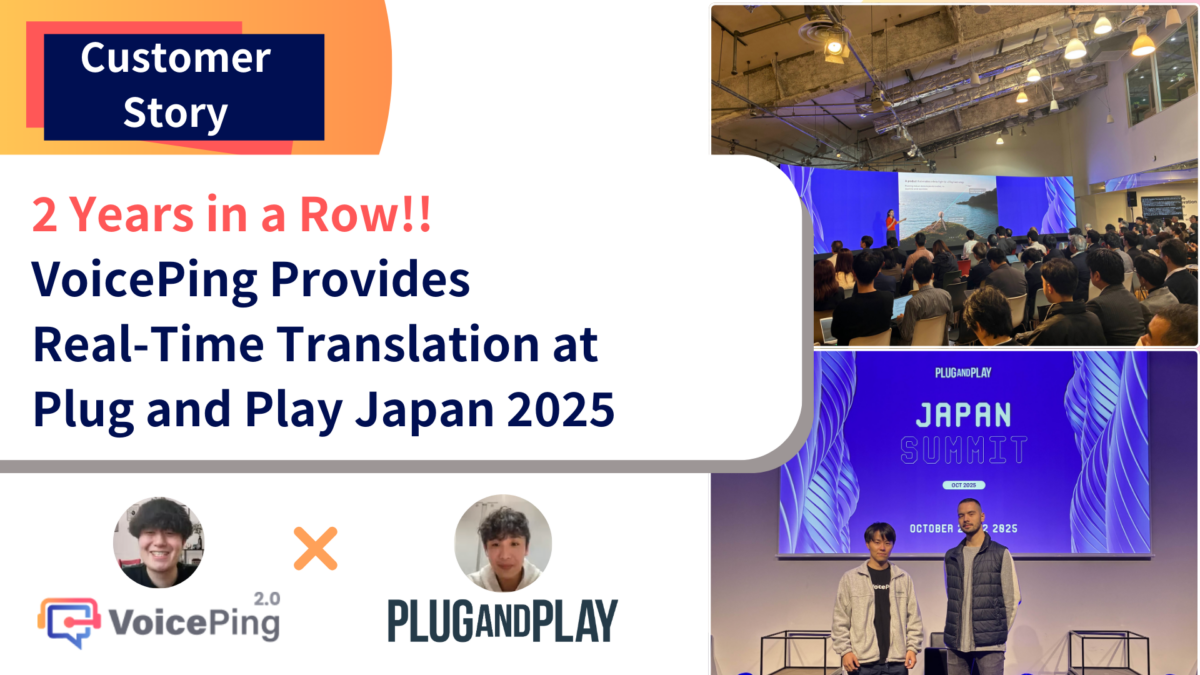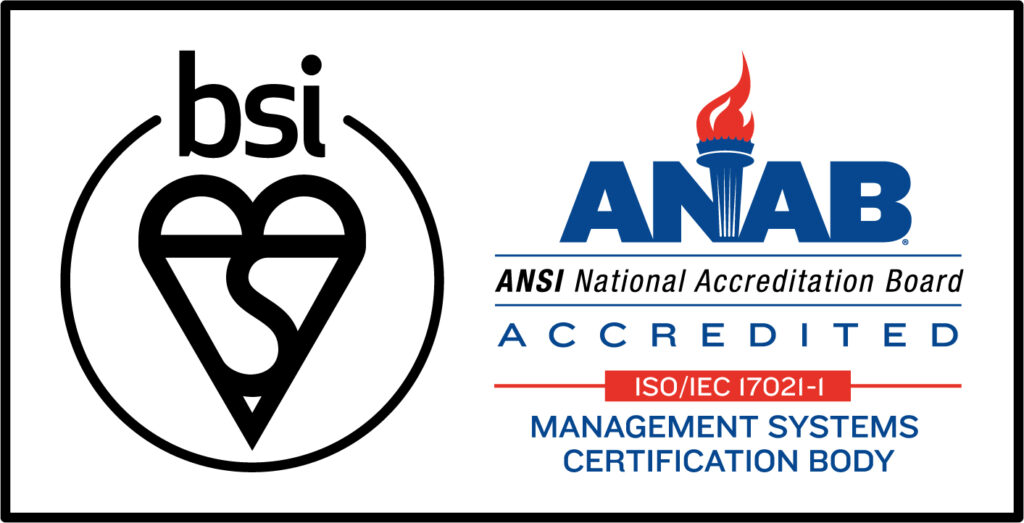The Power of Real-Time Translation to Accelerate Global Innovation: VoicePing × Plug and Play Japan
In recent years, the internationalization of the startup ecosystem has accelerated, and cross-border business collaborations have become routine. However, language barriers still exist as a significant challenge. This time, we spoke with Mr. Ito, who oversees management planning and this major event, about their experience using VoicePing in their daily operations and at the large-scale “Plug and Play Japan Summit 2025” event with approximately 2,200 participants, where VoicePing was implemented for the second consecutive year.

Global Accelerator Promoting n-to-n Collaboration
First, could you tell us about your role and about Plug and Play Japan?
Mr. Ito:Allow me to introduce myself again. I’m Taisho Ito from Plug and Play Japan. I am a Senior Manager, Corporate & Operations Department which is for the management planning department, handling company strategy and long-term initiatives. This time, I was in charge of overseeing the “Plug and Play Japan Summit,” a completely open event held once a year.
Plug and Play itself is originally a Silicon Valley-based VC (Venture Capital) and accelerator. We have over 60 bases worldwide-facilitate collaboration between startups and large corporations and drive innovation.
Does Plug and Play Japan Summit have characteristics that differ from other startup events?
Mr. Ito:Yes. As I mentioned earlier, we have over 60 bases in the world, and while we run industry-specific programs like other accelerators commonly do, we are very conscious on creating horizontal connections among large corporations. We call it a consortium-type accelerator program, and we designed to foster n-to-n collaboration, not only between large corporations but also between startups.
Furthermore, among our 60+ locations, we host events with a strong focus for being global and we have about 25 industry-specialized expert teams worldwide. We cover FinTech,InsurTech, AI, of course, but also semiconductors, real estate, and other finely specialized domains- which allows us to share deep knowledge and trends. I believe these characteristics truly distinguish us from other organizations.
Reasons for 2 Years in a Row: The Triple Benefits of Usability, Speed, and Accuracy
In such an event where technical terminology flies around, could you tell us why you implemented VoicePing for two consecutive years?
Mr. Ito: Regarding VoicePing, we actually have an ongoing contract with you, and we use your service not only for this event but also for regular meetings with clients and startups, as well as smaller events held at our office.
We found that VoicePing outperforms compared to other providers in terms of usability, speed, and accuracy.
Also, from last year’s surveys and feedback, having a simultaneous interpretation tool added significant value to the event, so we felt it was absolutely essential, that is why we requested their services again this year.
As I mentioned earlier, since this is an event with a strong global focus, with many speakers from overseas, and participants from abroad. We are consciously committed to making effective use of tools like VoicePing.
Implementation Results: Significant Reduction in Time and Resources for Regular Pitch Events
Your company has been using VoicePing not only for this event but also regularly. What problems were you able to solve? What benefits have you experienced within your company?
Mr. Ito: Probably the most common use case is in our office’s small event space, which can accommodate around 100 to 150 people. We hold events there about 2 to 3 times a week on average, and we frequently useVoicePing for simultaneous interpretation.
The accuracy is very high, including technical terminology. In the past, before and after each startup’s pitch, we would go on stage and give a brief explanation.
For example, before or after an English pitch, we would say something like, “This startup is this kind of company, they aim to do this. They have this technology, and they just said this, so if you have the opportunity, please talk to them during the networking session afterward,” taking about 30 seconds to 1 minute to explain.
Now, thanks to the tool’s strong performance and level of detail, everything we want to convey is communicated more clearly and with greater immediacy, without us having to add the effort. I find that’s the greatest value—both in terms of event time reduction and our operational workload.
Another advantage is that the interpretation data remains as a record, it can be used as a documentation of event pitches and meeting minutes, which is also extremely helpful.
7 People Designing and Planning an Event for 2,200 People: Support Plan Reduces Burden
Regarding this event, were there any positive aspects in terms of communication during the preparation stage or the effort required for implementation?
Mr. Ito: On the contrary, without any input from us, they came on the day and handled everything with a “just leave it to us” mindset, which was incredibly helpful. Of course, a few months before the event, we aligned on essentials, but for all other details, we really left everything to them, and they managed it flawlessly, so as the event supervisor and organizer, I have no complaints—only gratitude.
For this event, which hosted about 2,200 attendees, even though all employees -about 60 to 70 people are involved on the day the advance preparation should be done by just 7 of us this time. As we are only 7 people handling all the event design, planning, and operations, having a partner- VoicePing who can support us without detailed instructions provides an enormous sense of security.
Were there any reactions to VoicePing at this event?
Mr. Ito: VoicePing was recognized as extremely useful again this year. For some stages, we actually requested simultaneous interpretation by human interpreters. Compared to that, we received comments that VoicePing was on par with them, and we were able to deliver highly satisfying content at our event, thanks to VoicePing.
This time we had 5 stages, one with simultaneous interpretation, two with VoicePing, and the other two without anything in particular, but depending on the session, we also partially implemented VoicePing, which we do for our regular events.
Accommodating Diverse Accents: Proven Performance at Global Events
Are there any points you’d like improved or requests you have from regular use?
Mr. Ito: Well, honestly, I do not have many requests for VoicePing. There is nothing particular that I want them to change. It’s very easy to use if you understand how to connect it properly.
If I had to mention one thing, it would be the screensaver issue. Our company PCs automatically go to sleep after 5 minutes. Due to the security settings on our meeting PCs, we can’t change this.
If VoicePing could have a function to prevent the screensaver from activating, it would be helpful because during events we proceed while projecting the screen, but unless someone moves the cursor every few minutes, the screen goes black, so we have to assign someone to handle that, and it becomes a discussion of “who’s taking care of it today?” If it could be done as a software setting, I’d really appreciate it.
QR Code Feature Resolves Venue Constraints
Could you share your outlook and what you’d like to do for next year’s event?
Mr. Ito: Of course, as a business, we support collaboration and open innovation as both an accelerator business and venture capital firm, but even setting aside the business aspect, our vision is to be an innovation platformer. Contributing to the, ecosystem is one of our core visions and missions, so I believe we need to create and strengthen a structure and mindset that can properly embody that vision.
Japan Summit has also grown into a very large annual event. To contribute to the ecosystem, the startup community, and open innovation, we need to create an environment where people can casually drop by feeling no barriers and develop interest, in that sense, this event plays a very essential role.
By working with VoicePing, we can remove the language barrier and communication wall that inevitably become very high hurdles when advancing global collaboration in any business. I think solution tools like VoicePing help eliminate these barriers, so if an opportunity arise next year, we’d love to work with you again. We’d like to continue our partnership with VoicePing, who provides perfect support even when we leave everything to them.
Post-Event Review Efficiency Through Meeting Log Features
We introduced a case study of implementing the real-time translation tool VoicePing at Plug and Play Japan Summit 2025.
At an event where startups and large corporations with global backgrounds gather, VoicePing was able to achieve significant reductions in time and resources in situations where manual overview explanations were previously necessary.
In preparing and operating a large-scale event of 2,200 people with a lean team of 7 people, VoicePing’s reliability and minimal operational burden created great value. It’s also used regularly at small-scale events held 2-3 times per week, playing an important role in removing language barriers in the startup ecosystem.
In Plug and Play Japan’s efforts to promote n-to-n collaboration and build a global ecosystem as an innovation platformer, VoicePing has become an indispensable partner.
We will continue to dedicate ourselves to development to provide a more accurate and natural translation experience.
Future Vision: Creating Innovation Beyond Language Barriers
VoicePing removes language barriers with fast and accurate real-time translation, providing an environment where participants of different nationalities and cultures can interact seamlessly.
📱 Easy implementation for immediate use!
No dedicated devices needed—you can use high-precision translation right away. We support smooth communication at startup pitches, meetings with large corporations, and networking sessions.
By implementing VoicePing, you can enjoy these benefits:
🌍 Multinational participants understand content in their native language
We provide an environment where participants don’t feel language barriers in any session and can understand deeply.
⚡ Significantly reduce operational resources
Manual summary explanations become unnecessary, making it possible to operate large-scale events even with limited personnel.
💡 Easy review with recording and documentation features
Post-event confirmation and sharing with those who couldn’t attend becomes smooth.
If you want to evolve your next event into a venue for international knowledge sharing, please utilize VoicePing!
For more details, please apply for an individual consultation.
Experience VoicePing’s effectiveness with a free trial. Sign up here


